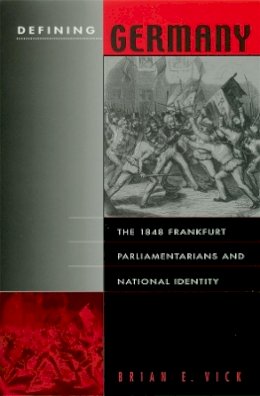
Defining Germany
Brian E. Vick
In a unique blend of political, intellectual, and cultural history, Brian Vick explores the world of German nationalism during the first half of the nineteenth century. Vick first presents an original investigation of German conceptions of nationhood in these decades before moving on to analyze the efforts of deputies at the Frankfurt Constituent National Assembly to construct a German national state based on the ethnically diverse German Confederation. He examines debates over fundamental issues that included citizenship qualifications, minority linguistic rights, Jewish emancipation, and territorial disputes, and offers valuable insights into nineteenth-century liberal opinion on the Jewish Question, language policy, and ideas of race.
Contrary to the often invoked dichotomy between cultural and political types of nationalism, in which the German case is usually seen as prototypical of the xenophobic, exclusionary cultural form, this study reveals how German nationalists at Frankfurt interwove cultural and political strands of the national ideal so finely as to sanction equal citizenship status in the proposed state for both the German-Jewish minority and the non-German-speaking nationalities within its boundaries. Yet deputies also contentiously defined Germany's borders so as to incorporate the latter, often unwilling groups, thereby hoping to dominate them both culturally and politically. Conflict was thus as much a part of this "culture of nationhood" as inclusion.
Product Details
About Brian E. Vick
Reviews for Defining Germany
Konrad H. Jarausch, University of North Carolina, Chapel Hill Even on such well-studied issues as the contrast between the little German and greater German plans for national unification, Vick finds something new and insightful to say. The accounts of the pre-1848 discussions of the nature of the nation and national honor-notably on German racial thought in the 1840s and the extent to which it upheld ideals of human equality and common humanity, and the relationship between nationalism and the classical republican tradition-are especially good, breaking intellectual new ground.
Jonathan Sperber, University of Missouri
